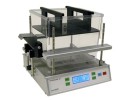Authors
Nguyen KP, o'neal TJ, Bolonduro OA, White E, Kravitz AV
Lab
Diabetes, Endocrinology, and Obesity Branch, National Institute of Diabetes and Digestive and Kidney Diseases, National Institutes of Health, Building 10-CRC, Room 5-5932, Bethesda, MD 20892, USA
Journal
J Neurosci Methods.
Abstract
BACKGROUND:
Measuring food intake in rodents is a conceptually simple yet labor-intensive and temporally-imprecise task. Most commonly, food is weighed manually, with an interval of hours or days between measurements. Commercial feeding monitors are excellent, but are costly and require specialized caging and equipment.
NEW METHOD:
We have developed the Feeding Experimentation Device (FED): a low-cost, open-source, home cage-compatible feeding system. FED utilizes an Arduino microcontroller and open-source software and hardware. FED dispenses a single food pellet into a food well where it is monitored by an infrared beam. When the mouse removes the pellet, FED logs the timestamp to a secure digital (SD) card and dispenses a new pellet into the well. Post-hoc analyses of pellet retrieval timestamps reveal high-resolution details about feeding behavior.
RESULTS:
FED is capable of accurately measuring food intake, identifying discrete trends during light and dark-cycle feeding. Additionally, we show the utility of FED for measuring increases in feeding resulting from optogenetic stimulation of agouti-related peptide neurons in the arcuate nucleus of the hypothalamus.
COMPARISON TO EXISTING METHODS:
With a cost of ∼$350 per device, FED is >10× cheaper than commercially available feeding systems. FED is also self-contained, battery powered, and designed to be placed in standard colony rack cages, allowing for monitoring of true home cage feeding behavior. Moreover, FED is highly adaptable and can be synchronized with emerging techniques in neuroscience, such as optogenetics, as we demonstrate here. CONCLUSIONS:
FED allows for accurate, precise monitoring of feeding behavior in a home cage setting.
BIOSEB Instruments Used:
OXYLET, Indirect Calorimeter (OXYLET)

 Pain - Thermal Allodynia / Hyperalgesia
Pain - Thermal Allodynia / Hyperalgesia Pain - Spontaneous Pain - Postural Deficit
Pain - Spontaneous Pain - Postural Deficit Pain - Mechanical Allodynia / Hyperalgesia
Pain - Mechanical Allodynia / Hyperalgesia Learning/Memory - Attention - Addiction
Learning/Memory - Attention - Addiction Physiology & Respiratory Research
Physiology & Respiratory Research
 Pain
Pain Metabolism
Metabolism Motor control
Motor control Neurodegeneration
Neurodegeneration Cross-disciplinary subjects
Cross-disciplinary subjects Muscular system
Muscular system General activity
General activity Mood Disorders
Mood Disorders Other disorders
Other disorders Joints
Joints Central Nervous System (CNS)
Central Nervous System (CNS) Sensory system
Sensory system
